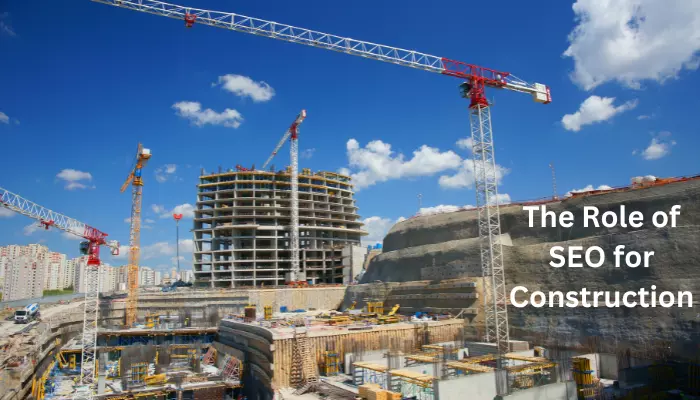SEO for construction companies involves optimizing digital assets to enhance their visibility on search engines like Google, Bing, and Yahoo. This process not only increases the likelihood of attracting potential clients but also ensures that the company is well-positioned to compete in a highly competitive market.

Definition of SEO for Construction Companies
SEO for Construsction Companies plays a crucial role in ensuring that their online assets, such as websites and content, are easily discoverable by potential clients and stakeholders. It involves a combination of technical, on-page, and off-page optimization strategies to improve the website’s performance and relevance in search engine algorithms.
Overview of Search Engine Optimization (SEO)
Search Engine Optimization (SEO) is a digital marketing strategy aimed at enhancing a website’s visibility on search engines like Google, Bing, and Yahoo. The primary goal of SEO is to improve a website’s ranking in search engine results pages (SERPs) for relevant keywords and phrases. By optimizing various elements on a website and creating high-quality, relevant content, businesses can attract more organic (non-paid) traffic and increase their online presence.
Understanding SEO for Construction Companies
Keywords and Construction Industry Relevance:
Identify relevant keywords: Research and choose keywords specific to the construction industry. Local Pro1 provides the best services of SEO for construction companies, locations served, and specific expertise (e.g., residential construction, commercial building, remodeling).
Long-tail keywords: Incorporate long-tail keywords that reflect specific services or solutions your construction company provides. This can improve the likelihood of attracting targeted traffic.
On-Page SEO Best Practices:
Title tags: Optimize title tags with relevant keywords and keep them concise. Include your company name and the primary service or location.
Meta descriptions: Craft compelling meta descriptions that summarize page content and encourage click-throughs. Include relevant keywords.
Header tags: Use the H1, H2, and H3 tags to appropriately organize your material. Incorporate keywords where appropriate.
Image optimization: Make use of alt text and descriptive file names to optimize your photographs. This not only improves SEO but also enhances accessibility.
Off-Page SEO Strategies for Construction Websites:
Backlink building: Develop a strategy for acquiring quality backlinks from reputable websites. This can include outreach to industry publications, local directories, and partnerships with relevant businesses.
Social media presence: Establish and maintain a presence on social media platforms. Share content, engage with followers, and promote your construction projects to increase brand visibility.
Online reviews: Urge pleased customers to post favorable reviews on websites such as Google My Business. Positive reviews can improve local search rankings and build trust with potential customers.
Technical SEO Considerations in Construction:
Site structure: Ensure a clear and logical site structure, making it easy for both users and search engines to navigate. Use a clean URL structure that includes relevant keywords.
Mobile optimization: Optimize your website for mobile devices to improve user experience and meet Google’s mobile-friendly criteria.
Page speed: Improve website loading times by optimizing images, leveraging browser caching, and employing content delivery networks (CDNs).
Schema markup: Implement schema markup to provide search engines with additional context about your content, such as reviews, ratings, and specific services.
The Role of SEO for Construction Companies

Driving Organic Traffic
Importance of Organic Search in the Construction Sector
In the highly competitive landscape of the construction industry, establishing a robust online presence is crucial for success. Organic search, facilitated by Search Engine Optimization (SEO), plays a pivotal role in driving relevant and targeted traffic to construction company websites. Prospective clients often turn to search engines to find construction services, making it imperative for companies to optimize their online visibility.
Long-term Benefits of Organic Traffic
Unlike paid advertising, which provides immediate visibility but diminishes once the budget is exhausted, organic traffic offers sustainable, long-term benefits. SEO efforts contribute to the gradual accumulation of authority and relevance, ensuring a continuous stream of visitors over time. By consistently producing high-quality, relevant content and optimizing website elements, construction companies can secure a lasting position in search engine rankings.
Establishing Credibility and Trust
Building a Strong Online Presence
A strong online presence is essential for construction companies to instill confidence in potential clients. SEO contributes significantly to building this presence by ensuring the company’s website ranks prominently in search results. When users consistently encounter a construction company at the top of relevant search queries, it reinforces the perception of credibility and expertise.
Trust Signals for Construction Websites
Trust signals are crucial for converting website visitors into clients. Construction companies can leverage SEO services to incorporate trust-building elements into their online presence. This includes showcasing client testimonials, certifications, awards, and case studies on the website. Additionally, ensuring a secure and user-friendly website, optimizing for mobile devices, and providing accurate contact information all contribute to a positive user experience, further solidifying the company’s credibility.
Local SEO for Construction Companies

Targeting Local Customers:
Construction companies primarily serve a local market. Whether it’s residential or commercial construction, the majority of clients are likely to be in the immediate vicinity. Local SEO ensures that your business appears prominently in local search results, making it easier for potential customers to find your services when they search for construction-related keywords in your area.
Google My Business Optimization for Construction:
Google My Business (GMB) is a powerful tool for local SEO, especially for construction companies. GMB listings appear prominently in local search results and Google Maps, providing essential information about your business to potential customers. Here’s how to optimize your Google My Business profile for a construction business.
Complete and Verify Your Profile: Ensure that all relevant details about your construction company, such as name, address, phone number, and website, are accurate and complete. Verify your business to gain trust and improve visibility.
Add High-Quality Photos: Showcase your construction projects with high-quality images. This not only provides potential customers with a visual representation of your work but also improves engagement with your GMB listing.
Manage Reviews: Encourage satisfied customers to leave positive reviews on your GMB profile. As an example of your dedication to client pleasure, reply to reviews—both positive and negative—as soon as possible.
Use Relevant Keywords: Incorporate relevant keywords in your business description, services, and posts on your GMB profile. This helps Google understand your business and improves its chances of showing up in local searches.
Regularly Update Information: Keep your GMB profile up-to-date with accurate business hours, special promotions, and any changes in services. This ensures that potential customers have the most current information.
Why SEO Matters for Home Builders Companies
Targeting Home Building Keywords
Localized Keywords: Home builders operate in specific geographic areas. Optimizing for localized keywords (e.g., “custom home builders in [city]”) helps target potential customers in the company’s service area.
Long-tail Keywords: Utilizing long-tail keywords related to home building services (e.g., “energy-efficient home construction,” “luxury home builders,” “modern home designs”) can attract a more niche audience interested in specific offerings.
Content Optimization: Ensure that website content writing, including blog posts and service pages, incorporates relevant keywords naturally. This not only improves search engine rankings but also provides valuable information to potential clients.
Mobile Optimization: Many users search for home builders on mobile devices. Optimizing the website for mobile responsiveness is crucial for a positive user experience and can positively impact search rankings.
Case Studies on Successful Home Builder SEO
XYZ Home Builders: XYZ Home Builders implemented a comprehensive SEO strategy focusing on local keywords. By optimizing their website for city-specific terms and creating location-specific landing pages, they saw a 30% increase in organic traffic within six months.
Case Study: Sustainable Homes Inc: Sustainable Homes Inc. utilized SEO to target environmentally conscious clients. By incorporating keywords related to eco-friendly home building, they not only attracted a specific audience but also secured top positions in search engine results for relevant terms.
Custom Designs Construction: Custom Designs Construction implemented a content marketing strategy, regularly publishing blog posts on home design trends, construction tips, and client success stories. This not only improved their SEO but also positioned them as industry experts, leading to increased inquiries and conversions.
Responsive Web Design Success: A home builder revamped its website with a focus on responsive design. This improved user experience across devices, leading to a decrease in bounce rates and an increase in the average time spent on the site. As a result, search engines recognized the site as more valuable, contributing to higher rankings.
Conclusion
Implementing a robust SEO strategy is paramount for the success of construction companies in the digital age. With the increasing reliance on online platforms for information, services, and products, a strong online presence can significantly impact a construction company’s visibility and success. Here are key takeaways for optimizing SEO for construction companies. Feel free to contact us for any type of query or services related to SEO for construction companies.
FAQs
What Is Seo, And Why Is It Important For Construction Companies?
SEO stands for Search Engine Optimization. It is crucial for construction companies as it helps improve their online visibility, making it easier for potential clients to find their services through search engines like Google.
How Can Construction Companies Benefit From Local Seo?
Local SEO allows construction firms to target a specific geographic area, making it easier for local clients to discover and engage with their services. This involves optimizing Google My Business listings, local keywords, and location-specific content.
What Role Does Keyword Research Play In SEO for Construction Companies?
Keyword research helps construction companies identify the terms and phrases potential clients use when searching for construction services. Integrating these keywords into website content enhances visibility in search engine results.
How Does Mobile Optimization Impact SEO for Construction Websites?
Mobile optimization ensures that a construction company’s website is user-friendly on smartphones and tablets. Since Google prioritizes mobile-friendly sites, this optimization positively affects search rankings and user experience.
Why Is Quality Content Important For Seo In The Construction Industry?
High-quality, relevant content showcases a construction company’s expertise and provides valuable information to potential clients. Regularly updating a blog with project updates and industry insights can improve search engine rankings.
